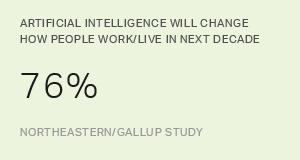One of the first major discoveries that ║┌┴¤═° made when it started surveying the world more than a decade ago was that what the whole world wants more than anything is a good job. Not only do good jobs provide financial security, but they also elevate people's wellbeing and happiness.
But what will happen when advances in science and technology make some good jobs redundant? What if these advances take away more jobs than they create? These are critical questions for the future of work.
When the asks people in more than 140 countries whether they believed science and technology will increase or decrease the number of jobs in their local area in the next five years, people are almost three times more likely to say science and technology will increase (58%) rather than decrease (21%) the number of jobs in the local economy.
| Net Impact Score | |||||||||||||||||||||||||||||||||||||||||||||||||||||||||||||||||||||||||||||||||||||||||||||||||||
|---|---|---|---|---|---|---|---|---|---|---|---|---|---|---|---|---|---|---|---|---|---|---|---|---|---|---|---|---|---|---|---|---|---|---|---|---|---|---|---|---|---|---|---|---|---|---|---|---|---|---|---|---|---|---|---|---|---|---|---|---|---|---|---|---|---|---|---|---|---|---|---|---|---|---|---|---|---|---|---|---|---|---|---|---|---|---|---|---|---|---|---|---|---|---|---|---|---|---|---|
| World | 37 | ||||||||||||||||||||||||||||||||||||||||||||||||||||||||||||||||||||||||||||||||||||||||||||||||||
| A positive net impact score means people are more optimistic than pessimistic about job prospects in relation to science and technology, and a negative score means the opposite. | |||||||||||||||||||||||||||||||||||||||||||||||||||||||||||||||||||||||||||||||||||||||||||||||||||
| Wellcome Global Monitor | |||||||||||||||||||||||||||||||||||||||||||||||||||||||||||||||||||||||||||||||||||||||||||||||||||
Despite the perceived positive net impact at the global level, fewer individuals in high-income countries are positive about the potential impact of science and technology on jobs where they live. Those with the lowest level of education in high-income countries actually foresee a negative net impact on jobs.
| High-income countries | Not high-income countries | ||||||||||||||||||||||||||||||||||||||||||||||||||||||||||||||||||||||||||||||||||||||||||||||||||
|---|---|---|---|---|---|---|---|---|---|---|---|---|---|---|---|---|---|---|---|---|---|---|---|---|---|---|---|---|---|---|---|---|---|---|---|---|---|---|---|---|---|---|---|---|---|---|---|---|---|---|---|---|---|---|---|---|---|---|---|---|---|---|---|---|---|---|---|---|---|---|---|---|---|---|---|---|---|---|---|---|---|---|---|---|---|---|---|---|---|---|---|---|---|---|---|---|---|---|---|
| Up to primary education | -6 | 44 | |||||||||||||||||||||||||||||||||||||||||||||||||||||||||||||||||||||||||||||||||||||||||||||||||
| Up to secondary education | 9 | 43 | |||||||||||||||||||||||||||||||||||||||||||||||||||||||||||||||||||||||||||||||||||||||||||||||||
| Up to college/university education | 18 | 42 | |||||||||||||||||||||||||||||||||||||||||||||||||||||||||||||||||||||||||||||||||||||||||||||||||
| Wellcome Global Monitor | |||||||||||||||||||||||||||||||||||||||||||||||||||||||||||||||||||||||||||||||||||||||||||||||||||
The Group of Seven ("G7"), an informal bloc of the seven largest, industrialized democracies meet in France in August. One of their stated objectives is to create more equitable globalization, a tough challenge given an increase in the use -- and the threat of the use -- of tariffs as a mechanism to protect and encourage domestic job creation.
Should these countries look to embrace the free trade agenda, they may face greater domestic resistance given the high levels of fear around scientific and technological disruption of local job markets within the G7 countries. The most extreme example of this is France, the only country globally where over half the population (55%) believe technology and science will reduce jobs.
| Increase | Decrease | ||||||||||||||||||||||||||||||||||||||||||||||||||||||||||||||||||||||||||||||||||||||||||||||||||
|---|---|---|---|---|---|---|---|---|---|---|---|---|---|---|---|---|---|---|---|---|---|---|---|---|---|---|---|---|---|---|---|---|---|---|---|---|---|---|---|---|---|---|---|---|---|---|---|---|---|---|---|---|---|---|---|---|---|---|---|---|---|---|---|---|---|---|---|---|---|---|---|---|---|---|---|---|---|---|---|---|---|---|---|---|---|---|---|---|---|---|---|---|---|---|---|---|---|---|---|
| % | % | ||||||||||||||||||||||||||||||||||||||||||||||||||||||||||||||||||||||||||||||||||||||||||||||||||
| France | 29 | 55 | |||||||||||||||||||||||||||||||||||||||||||||||||||||||||||||||||||||||||||||||||||||||||||||||||
| Italy | 44 | 43 | |||||||||||||||||||||||||||||||||||||||||||||||||||||||||||||||||||||||||||||||||||||||||||||||||
| United Kingdom | 45 | 38 | |||||||||||||||||||||||||||||||||||||||||||||||||||||||||||||||||||||||||||||||||||||||||||||||||
| Germany | 41 | 37 | |||||||||||||||||||||||||||||||||||||||||||||||||||||||||||||||||||||||||||||||||||||||||||||||||
| Japan | 26 | 36 | |||||||||||||||||||||||||||||||||||||||||||||||||||||||||||||||||||||||||||||||||||||||||||||||||
| Canada | 53 | 33 | |||||||||||||||||||||||||||||||||||||||||||||||||||||||||||||||||||||||||||||||||||||||||||||||||
| United States | 61 | 28 | |||||||||||||||||||||||||||||||||||||||||||||||||||||||||||||||||||||||||||||||||||||||||||||||||
| Wellcome Global Monitor | |||||||||||||||||||||||||||||||||||||||||||||||||||||||||||||||||||||||||||||||||||||||||||||||||||
Despite the Trump administration's increased use of tariffs, ║┌┴¤═°'s polling last year showed that 70% of Americans support free trade in recognition of the benefits that it provides and only 25% of the population regard foreign imports as a threat. Americans' perspectives about their readiness to capture the benefits of future jobs may explain this position.
Recent projections by economists propose that the top-three-largest economies in PPP by 2030 will be China, India and the United States. In contrast to the despondent view within Europe and Japan, there is confidence within the general population of all three countries that they will be the beneficiaries of science- and technology-led job creation.
| Increase | Decrease | ||||||||||||||||||||||||||||||||||||||||||||||||||||||||||||||||||||||||||||||||||||||||||||||||||
|---|---|---|---|---|---|---|---|---|---|---|---|---|---|---|---|---|---|---|---|---|---|---|---|---|---|---|---|---|---|---|---|---|---|---|---|---|---|---|---|---|---|---|---|---|---|---|---|---|---|---|---|---|---|---|---|---|---|---|---|---|---|---|---|---|---|---|---|---|---|---|---|---|---|---|---|---|---|---|---|---|---|---|---|---|---|---|---|---|---|---|---|---|---|---|---|---|---|---|---|
| % | % | ||||||||||||||||||||||||||||||||||||||||||||||||||||||||||||||||||||||||||||||||||||||||||||||||||
| United States | 61 | 28 | |||||||||||||||||||||||||||||||||||||||||||||||||||||||||||||||||||||||||||||||||||||||||||||||||
| Japan | 59 | 14 | |||||||||||||||||||||||||||||||||||||||||||||||||||||||||||||||||||||||||||||||||||||||||||||||||
| China | 68 | 12 | |||||||||||||||||||||||||||||||||||||||||||||||||||||||||||||||||||||||||||||||||||||||||||||||||
| Wellcome Global Monitor | |||||||||||||||||||||||||||||||||||||||||||||||||||||||||||||||||||||||||||||||||||||||||||||||||||
Implications
Despite the recent creation of the world's largest free trade area -- the African Continental Free Trade Agreement -- global free trade appears to be at an inflection point. The states of mind measured by the Wellcome Global Monitor become increasingly important as they provide an indication of the level of fear or hope for the future that the general population has about jobs.
These figures provide insight into the public's appetite for new tariffs billed as mechanisms to protect domestic jobs, as well as into politicians' willingness to use this potential policy lever.
More detailed analysis about the world's attitudes toward science is available in the , and the data are open to the public through the Wellcome website.




